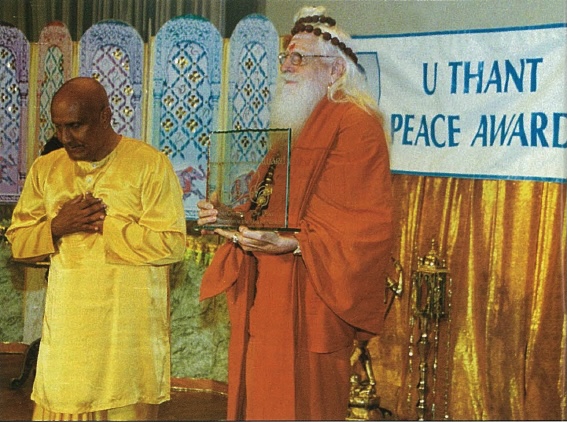Two hundred and fifty meditators, diplomats and friends gathered to honor Satguru Sivaya Subramuniyaswami on August 25, 2000, at the Dag Hammarskjöld Auditorium at the United Nations in New York as he was presented the U Thant Peace Award by Sri Chinmoy. Gurudeva, as Subramuniyaswami is known, was in New York as a Hindu delegate to the Millennium Peace Summit of Religious and Spiritual Leaders which opened at the UN on August 28. The prestigious prize has previously been bestowed by Sri Chinmoy upon Nelson Mandela, Mikhail Gorbachev, Pope John Paul II, Mother Teresa, the Dalai Lama, Desmond Tutu and Dada J.P. Vaswani. First offered in 1982, the award is given to individuals and organizations who have exemplified the lofty spiritual ideals of the late United Nations’ Secretary-General U Thant and implemented those ideals in the tireless pursuit of world peace.
“With utmost gratitude, humility and reverence,” a Chinmoy devotee announced from the stage at Hammarskjöld Auditorium, “Sri Chinmoy prayerfully offers the U Thant Peace Award to Satguru Sivaya Subramuniyaswami, the illumining oneness-light of modern Hinduism.” Subramuniyaswami was praised for “energizing, inspiring and uniting Hindus with his dynamic approach to an ancient faith,” for “reawakening in Hindus everywhere a deep love for their living religion,” and through Hinduism Today magazine, “educating and inspiring Hindus and non-Hindus alike in the multifaceted aspects of pure Hindu philosophy, and its manifestation in culture and society worldwide.”
“His life radiates love, wisdom and simplicity,” said the presenters, “his message of peace is equally accessible to scholars and children. He is a distinguished leader in the interfaith movement, a champion of harmony in the family and in nature–indeed, a divinely compassionate and supremely committed friend of the Earth and all its inhabitants. Therefore we are profoundly honored today to present the U Thant Peace Award to Satguru Sivaya Subramuniyaswami.” The Sri Chinmoy choir sang two songs composed by Sri Chinmoy in tribute to Gurudeva. The capacity audience included UN staff, devotees of Sri Chinmoy and devotees of Gurudeva, several who had flown great distances for the event.
Gurudeva has for fifty years preached ahimsa, nonhurtfulness, as a central doctrine, teaching devotees to not hurt others physically, mentally or emotionally, and has particularly been a defender of women and children. The recognized hereditary guru of 2.5 million Sri Lankan Hindus, he has worked quietly for years to restore peace to that island nation. Gurudeva is the author of more than 30 books unfolding unique and practical insights on Hindu metaphysics, mysticism and yoga. Among his foremost publications are Dancing with Siva, Hinduism’s Contemporary Catechism, and Merging with Siva, Hinduism’s Contemporary Metaphysics. In 1986, Gurudeva was named by New Delhi’s World Religious Parliament as one of five modern-day Jagadacharyas, world teachers, for his international efforts in promoting a Hindu renaissance. In addition to the Millennium Peace Summit just completed, he has represented Hinduism at three meetings of the Global Forum of Spiritual and Parliamentary Leaders for Human Survival, and at the Parliament of the World’s Religions in 1993.
Sri Chinmoy created the U Thant Peace Award in 1979, eight years after Thant’s passing and with the blessings of Thant’s family. U Thant, the third Secretary-General of the United Nations and a devout Buddhist, sought to apply the principles of detachment and concentration to solving international problems. The Burmese diplomat was elected to the post in 1961 and served for ten years. Thant wrote, “As a Buddhist, I was trained to be tolerant of everything except intolerance. I was brought up not only to develop the spirit of tolerance, but also to cherish moral and spiritual qualities, especially modesty, humanity, compassion and, most important, to attain a certain degree of emotional equilibrium. I ever believe that the mark of a truly educated and imaginative person facing the twenty-first century is that he feels himself to be a planetary being.”
Thant, who meditated every day, found a kindred spirit in Sri Chinmoy at their first meeting, in 1972. Thant encouraged Chinmoy’s twice-weekly meditations at the UN for delegates and staff which had begun two years earlier. On the occasion of a play on the life of Buddha written by Sri Chinmoy and performed for the secretary-general in 1973, Thant said, “[By what] Sri Chinmoy has stressed in the play–love, compassion, tolerance, the philosophy of live-and-let-live, modesty and even humility–will we all be able to fashion the society we want, a truly moral society, a decent society, a livable society, which is the goal of all great religions.”
Sri Chinmoy: The Peace Meditation at the United Nations is an association of staff, delegates, nongovernmental organization representatives and accredited press correspondents. The twice-weekly meditations have continued uninterrupted now for 30 years. There, in a nondenominational environment conducive to deep reflection, participants are able to pause their daily work to strengthen their own inner peace as well as their outer commitment to world peace.
Sri Chinmoy himself is perhaps peace’s foremost evangelist, through his Peace Concerts, International Peace Run and the meditations he leads at the United Nations. He has gathered and guides an exceptionally well-disciplined group of followers spread around the world. Upon the Peace Meditation’s 30th anniversary, UN Secretary-General Kofi Annan wrote to Sri Chinmoy, “In this house dedicated to duty and debate in the service of peace, meditation serves the same cause in silence and in stillness.” On the same occasion, Mikhail Gorbachev, former president of the Soviet Union, said to Sri Chinmoy, “My friend, you are the personification for the United Nations of dedication to its noble ideals.”
Sri Chinmoy: Peace Meditation at the United Nations, PO Box 20, Room DN-1406, United Nations, New York, New York 10017 USA
